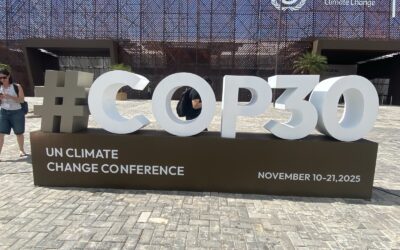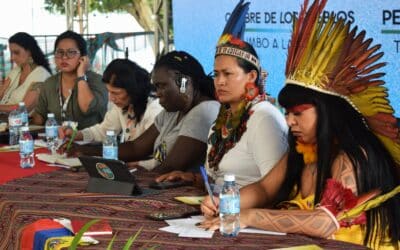Leer en español / Lire en français
The Global Forest Coalition at COP29
Baku, Azerbaijan
November 11-22, 2024
At UNFCCC COP29 in Baku, the Global Forest Coalition (GFC) is urging immediate action to end the financing of false solutions to climate change, such as carbon trading and offsetting, REDD+, monoculture plantations, bioenergy, and geoengineering. These projects, often carried out using bilateral and multilateral climate finance, avoid real emission reductions while displacing communities, damaging ecosystems, and exacerbating inequalities. GFC is calling for redirecting public funding to support genuine community-driven, rights-based, and gender-just, climate solutions.
GFC is also spotlighting the urgent need to transform global food and agriculture systems to foster climate resilience and justice. With industrial food systems contributing a third of global greenhouse gas emissions and heavily relying on fossil fuels, GFC is advocating for a shift from intensive, corporate-driven agriculture to agroecological systems that prioritize the rights of local communities, food sovereignty, and climate resilience.
As well as engaging with the negotiations and offering press conferences, briefings, actions, round tables, and side events, GFC representatives are available for expert comment and analysis. Contact details of GFC spokespersons and more information on our activities and key messages at COP29 are available below.
GFC spokespersons at COP29 available for interview:
Souparna Lahiri, GFC Senior Climate and Biodiversity Policy Advisor (EN)
souparna.lahiri@gmail.com / +91 98181 47740
Andrea Echeverri, re GFC Unsustainable Livestock Campaign Coordinator (EN/ES/FR)
Andrea.echeverri@globalforestcoalition.org / +57 311 6171939
Fataï Aina, Executive Director, Amis de l’Afrique Francophone Benin (FR)
+229 97 27 47 82
Leticia Tura, Director, Fase/National Agroecology Initiative (ANA), Brazil (PT/ES)
leticia@fase.org.br / +55 21 98636-1358
Maureen Santos, Coordinator, Fase/Belem Letter Group, Brazil (EN/ES/PT)
maureensantos@fase.org.br / +55 21 98869-5323
Linda Gonzáles Cárdenas, Censat Agua Viva (EN/ES/PT)
linda.gonzalez@censat.org / +57 321 3000 736
Tatiana Rodriguez, Censat Agua Viva
+57 300 225 7006 (EN/ES)
For media inquiries, interviews, and further information, please contact
Megan Morrissey (ENG/ESP) +12023656900, megan@globalforestcoalition.org
Ismail Wolff (ENG) +33 7 88 85 28 59, ismail.wolff@globalforestcoalition.org
Press Conferences
November 12, 15:00–15:30 (UTC+4) / Press Conference – Natavan, Area D (Live Webcast)
November 15, 16:00–16:30 (UTC+4) / Press Conference – Natavan, Area D (Live Webcast)
November 18, 15:30–16:00 (UTC+4) / Press Conference – Natavan, Area D (Live Webcast)
November 20, 15:00–15:30 (UTC+4) / Press Conference – Natavan, Area D (Live Webcast)
Side Events
November 15
Investing public finance to promote real climate solutions
18:30–20:00 (UTC+4)
Room 5
November 16
Phasing out of industrial animal agriculture towards an Equitable, Humane and Sustainable Food System as a pathway to 1.5C and Food Justice
10:00–11:30 (UTC+4)
Food Hub Pavilion
November 18
Delivering forest action, avoiding false solutions: global pathways for climate and nature
Organized by EPN and BAN
13:15–14:45 (UTC+4)
Room 4
Side Event at the Forests Pavilion
09:00–13:00 (UTC+4)
Blue Zone (C4, Zone E)
Workshops
November 12
In-session workshop under Article 6.8 of the Paris Agreement – GCNMA 6
10:00–14:00 AZT/UTC+4
Meeting Room 3, Area C
Resources
Who Really Benefits? How REDD+ Fails Forests and Those Who Protect Them
The False Promise of Biodiversity Offsets & the Myth of ‘No Net Loss’
Are Global Climate Talks Delivering for the World’s Forests?
GFC’S Key Messages
Denounce and resist market mechanisms: Move away from market-based false solutions such as carbon trading and offsetting through Articles 6.2 and 6.4 of the Paris Agreement.
Divest from false solutions to climate change: Redirect public funding away from monoculture plantations, REDD+, bioenergy, carbon offsets, geoengineering, and BECCS.
Fund real solutions to the climate crisis: Support climate funding policies that prioritize rights-based, gender-just, and community-governed solutions, providing direct access to funds for Indigenous Peoples, women, and local communities on the frontlines of climate change.
Strengthen food system governance: We must challenge the dominance of the food system by multinational corporations and put policies in place to foster transparency and hold them accountable for their social and environmental impacts.
Promote agroecological practices: A just transition necessitates the embracing of agroecology to promote human rights, environmental protection, and animal welfare, and to ensure food sovereignty meets food security needs while providing dignified and sustainable livelihoods.
Shift towards diets within planetary and social boundaries: Countries with high per capita consumption of animal-based products must transition to plant-rich diets with reduced meat and dairy to stay within planetary and social boundaries. This shift will benefit public health and free up land and resources to support diversified agroecological production systems.




